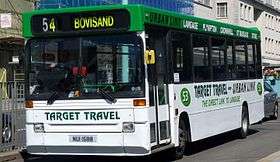Plaxton Pointer
| Plaxton Pointer | |
|---|---|
 Target Travel early, high-floor Plaxton Pointer bodied Dennis Dart in Plymouth in July 2010 | |
| Overview | |
| Manufacturer |
Reeve Burgess/Plaxton /TransBus/Alexander Dennis |
| Body and chassis | |
| Doors | 1 or 2 doors |
| Floor type | Step entrance/Low-floor (SLF) |
| Chassis |
Pointer (Step entrance): Dennis Dart Volvo B6 Pointer (Low floor): Dennis Dart SLF Volvo B6LE Pointer 2 (Low floor): Dennis Dart SLF |
| Powertrain | |
| Engine |
Cummins B-series (Dennis Dart) Cummins B-series/ISBe (Dennis Dart SLF) Volvo TD63 (Volvo B6) Volvo TD63/D6A (Volvo B6LE) |
| Capacity | 26 to 40 seated |
| Dimensions | |
| Length | Various, between 8.5 and 11.3m |
| Width | 2.4m |
| Chronology | |
| Successor | Alexander Dennis Enviro200 |
The Plaxton Pointer (originally known as the Reeve Burgess Pointer, and later as the TransBus Pointer and Alexander Dennis Pointer) is a single-decker bus body manufactured during the 1990s by Plaxton and latterly built by Alexander Dennis.
With the launch of the Dennis Dart in 1989, Plaxton's subsidiary Reeve Burgess made the Pointer body on the short 8.5 m chassis. Launched in 1991, at 2.3 m wide, this proved popular with many operators, and they sold in big numbers in London. The modular nature of both chassis and body meant for various permutations in length, with 8.5 m, 9.0 m and 9.8 m variants being manufactured. The Pointer became the most successful midibus body. The Pointer was also available with Volvo B6 chassis.
The introduction of the Super Low Floor version of the Dennis Dart, the Dart SLF, in 1995 saw the Pointer body redesigned with a 2.4 metre width, with a step-free entrance, giving easy access for the disabled. This redesigned Pointer bodywork was also built on the Volvo B6LE, one for the UK and the other 20 for Citybus of Hong Kong. The low floor Plaxton Pointer 1 and the Plaxton Pointer 2 have a rounded roof dome (more rounded than the step entrance Pointer) with a double-curvature windscreen. Not long after, the body received an all-new lower front end design, and alterations to the rest of the body - the Pointer 2 was born, and has proved to be just as successful. This was also available in a range of lengths to suit individual needs - 9.3 m, 10.1 m, 10.7 m, 11.3 m "Super Pointer Dart" (SPD), and after 3 years of production, the 8.8 m "Mini Pointer Dart" (MPD). The 11.3 m "Super Pointer Dart" (SPD) is considered as a full-sized single-decker bus.
In 1998, the Mayflower Group, owner of Alexander Coachbuilders, took over Dennis. The future of the Pointer at that time appeared uncertain as it was thought the Dart may be solely bodied by Alexander. As a result, Plaxton built two Pointer bodies on the Volvo B6BLE chassis known as Bus 2000, but the project was scrapped when Mayflower also purchased Plaxton, forming TransBus International. Certain design features of the scrapped Bus 2000 project have since been used on other designs, most notably the Alexander Dennis Enviro300 and Enviro500.
With the collapse of TransBus in 2004 and subsequent restructuring by the administrators, Plaxton and Alexander Dennis were sold to different parties. As Pointer production had been transferred to the former Alexander plant at Falkirk, it became an Alexander Dennis product. Plaxton, once again an independent company, signalled its return to the bus market by developing the Centro on VDL and MAN chassis to join its Primo low-floor minibus in competition with the Pointer.
In August 2006 Alexander Dennis launched the Enviro200 Dart as a replacement for the Pointer Dart.
Gallery
.jpg)
- Arriva Guildford & West Surrey Plaxton Pointer 1 bodied Dennis Dart SLF in Dorking in July 2009
See also
External links
 Media related to Plaxton Pointer at Wikimedia Commons
Media related to Plaxton Pointer at Wikimedia Commons- Alexander Dennis Pointer product website - Web archive